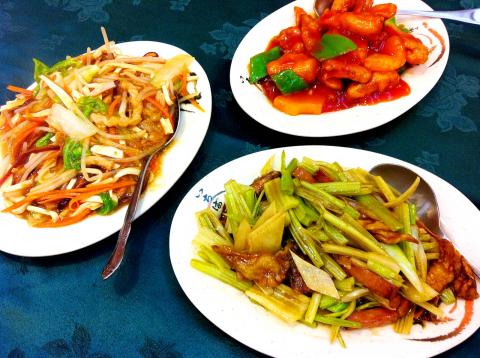A recent visit to King Join, an upscale vegetarian restaurant that serves fancy Beijing-style cuisine, (see the Feb. 18, 2011, edition of the Taipei Times), left me thinking: Sure, these quaint, refined recipes of the imperial court were nice and all, but what about some home-cooked grub for the people?
Enter Jingyuan Beiping Vegetarian Restaurant (京園北平素食館), which serves non-meat versions of standard northern dishes, among other favorites.
Located near Hsingtien Temple (行天宮), Jingyuan is the cleaner looking, and perhaps a tad healthier, version of your neighborhood Beijing/Beiping/(choose your favorite old name for the Chinese capital) “palace” or family-style restaurant.

Photo: David Chen, Taipei Times
It’s easy to forget you’re about to have a vegetarian meal glancing through Jingyuan’s nine-page menu. The selection is a long list of familiar dishes: an assortment of dumplings both steamed and fried, zhajiang mian, or fried sauce noodles (炸醬麵, NT$80), mapo tofu (麻婆豆腐, NT$138), kung pao chicken (宮保雞丁, NT$168), sweet and sour pork chops (糖醋排骨, NT$188). There’s even the basil-infused sanbeiji, or three cup chicken (三杯雞, NT$208).
Jingyuan uses various kinds of tofu and seitan (which is made out of wheat gluten) as meat substitutes, and like many places in Taiwan that cater to Buddhist vegetarian diets, the restaurant doesn’t cook with garlic, onion, shallot or leek.
This fact made the ganbian sijidou, or stir-fried green beans (乾扁四季豆, NT$168), seem even more impressive for its strong and savory flavor. Bits of smoked tofu mimicked minced meat, while zesty notes came from chopped day lily stems (金針筍), also called biyusun, or jade bamboo shoots (碧玉筍), a garlic substitute that looks like green onion. The dish made my dining companion pause after taking her first bite. “Wait. Are you sure this is vegetarian?” she asked.
You won’t ask that question about Jingyuan’s sweet and sour pork (糖醋里肌, NT$188), but it’s still very much worth trying for its sweet and tangy glaze and deep-fried goodness. Another house recommendation is the Hakka stir-fry (客家小炒, NT$188), which has a peppery bite and is chock-full of textures, from the crispness of the julienned celery to the tender bites of tofu.
The combination vegetable stir-fry (炒合菜, NT$168) was much more appetizing than it appeared and turned out to be one of our favorites. It looked like sweet-and-sour soup (酸辣湯), but without the soup. The ingredients were indeed similar: cabbage, carrot, rice noodles and tofu. It was also less greasy than the other stir-fry dishes.
Have the above items with rice or the fried bread (銀絲卷, NT$30 per piece), a mantou with a crispy, slightly sweet golden crust.
Jingyuan’s xiaolongbao (小籠包, NT$120 for a basket of 10) is not going to put Din Tai Fung out of business anytime soon, but these dumplings, filled with rice noodles, finely chopped tofu and vegetable greens, were refined in their own way. I had high hopes for the vegetarian potstickers (素食鍋貼, NT$80 for eight pieces), which were cooked to a perfect golden brown on the bottom, but the all-cabbage filling didn’t work — they fell apart after the first bite.
A few other northern classics on the menu include the xianbing, or meat pie (餡餅), and the xiangchun rolls (香椿卷餅, NT$60), a vegetarian version of fried scallion roll with beef (牛肉捲餅).
It’s hard to beat the real thing, but Jingyuan Beiping Vegetarian Restaurant comes pretty close, and the restaurant offers a nice upscale alternative to Taipei’s ubiquitous vegetarian buffets.

As Taiwan’s second most populous city, Taichung looms large in the electoral map. Taiwanese political commentators describe it — along with neighboring Changhua County — as Taiwan’s “swing states” (搖擺州), which is a curious direct borrowing from American election terminology. In the early post-Martial Law era, Taichung was referred to as a “desert of democracy” because while the Democratic Progressive Party (DPP) was winning elections in the north and south, Taichung remained staunchly loyal to the Chinese Nationalist Party (KMT). That changed over time, but in both Changhua and Taichung, the DPP still suffers from a “one-term curse,” with the

William Liu (劉家君) moved to Kaohsiung from Nantou to live with his boyfriend Reg Hong (洪嘉佑). “In Nantou, people do not support gay rights at all and never even talk about it. Living here made me optimistic and made me realize how much I can express myself,” Liu tells the Taipei Times. Hong and his friend Cony Hsieh (謝昀希) are both active in several LGBT groups and organizations in Kaohsiung. They were among the people behind the city’s 16th Pride event in November last year, which gathered over 35,000 people. Along with others, they clearly see Kaohsiung as the nexus of LGBT rights.

Jan. 26 to Feb. 1 Nearly 90 years after it was last recorded, the Basay language was taught in a classroom for the first time in September last year. Over the following three months, students learned its sounds along with the customs and folktales of the Ketagalan people, who once spoke it across northern Taiwan. Although each Ketagalan settlement had its own language, Basay functioned as a common trade language. By the late 19th century, it had largely fallen out of daily use as speakers shifted to Hoklo (commonly known as Taiwanese), surviving only in fragments remembered by the elderly. In

Dissident artist Ai Weiwei’s (艾未未) famous return to the People’s Republic of China (PRC) has been overshadowed by the astonishing news of the latest arrests of senior military figures for “corruption,” but it is an interesting piece of news in its own right, though more for what Ai does not understand than for what he does. Ai simply lacks the reflective understanding that the loneliness and isolation he imagines are “European” are simply the joys of life as an expat. That goes both ways: “I love Taiwan!” say many still wet-behind-the-ears expats here, not realizing what they love is being an